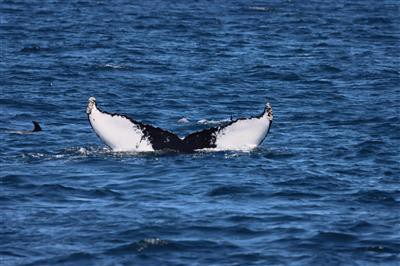For my final update before the 2022 Hackaday Prize judging commences, I want to share the two programs we've conducted this year that have reshaped how I think about the OpenCTD and the direction we're going.
The first is Community Oceanography While Watching Whales. For the last two years, we've partnered with professional naturalists working on commercial whale watching boats to collect oceanographic data in conjunction with whale sightings. When a whale watching boat spots a whale, they have to stop. They can observe, but once a whale is within a few hundred yards (100 yards for most whales, 500 for North Atlantic Right Whales), you can't approach. So there's a nice moment of calm where an educator can talk about whales, describe the behavior that guest are seeing, and, if conditions permit, take some oceanographic measurements.

photo via Blue Ocean Society for Marine Conservation
We supplied the OpenCTDs, and learned a ton about how users interact with the devices. This led to several redesigns to make things easier and more clear for the end user. Up until this point, my vision was that the end user would build their own OpenCTD, but it became clear that not everyone who wants to study the ocean also wants to build their instruments. Sometimes, you just need a device that works. The ocean is a clever monster, and keeps finding new and wonderful ways to brake my instruments. The OpenCTD is now more robust, easier to use, and we have the begins of a pipeline to provide CTDs to people who want them, but don't want to build them.
The second is SEAoTech, a program developed through the Bureau of Ocean Energy Management to provide hands on ocean science experiences to students in Alaska. Originally envisioned as in-person workshops, the pandemic forced us to go remote. This was the first time I had to create an OpenCTD kit to be built without my direct involvement. A workshop is much easier if you're there to keep watch over every step. Teaching students to solder circuit boards over Zoom was a stressful, but enlightening endeavor.
That project really highlighted for me how much we need a viable, accessible OpenCTD kit that takes the guesswork out of sourcing tools, consumables, and components and provides the kind of detailed instructions you need if you've never held a soldering iron before.
 andrew.david.thaler
andrew.david.thaler
Discussions
Become a Hackaday.io Member
Create an account to leave a comment. Already have an account? Log In.